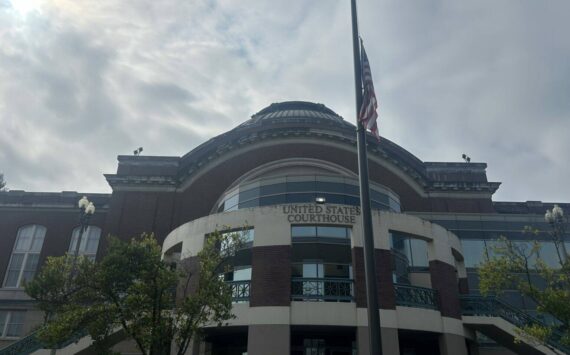By Morf Morford
Tacoma Daily Index
There’s an old saying that I never hear any more – “What you don’t know won’t hurt you”.
I don’t know when or where or under what circumstances that was ever true, but it certainly doesn’t ring as true lately.
Issues and problems that have been simmering for decades – if not longer – often far from view or public awareness – have been emerging, usually with a vengeance.
From climate change, to supply shortages across the spectrum from auto parts to building supplies, and of course a pesky virus or two have taught us all that there are plenty of non-negotiable principles of nature, of life and of the marketplace that are unforgiving if we remain oblivious to them.
Empty store shelves are something few of us in America ever expected to see.
Yet here they are. And we should have seen them coming.
Supply chains – their making – and their unmaking – are years in development.
The cliché about literal chains are that any chain is as strong as its weakest link.
And in 2020-21 we have seen more than our share of weak, if not broken, links, in the system of growers, pickers, processors, truck drivers and retailers that provide most, if not all, of our food.
Research shows that an average number of twenty people touch any given piece of produce before it gets to our plates.
Hindsight is 2020
There’s another old saying that has lost its way – “Hindsight is 2020”.
The point of this saying seems to be, once you know something, you know it.
And before you know something, you don’t know it.
Genius.
We are in an economy in 2021 where decisions and policies of a decade or generation ago are coming due and we, and coming generations, have a bill to pay.
And it’s a literal bill.
Inflation is rearing its little head in a way, and to a degree, we have not seen in a generation – or more.
And those in the financial sector (among many others) should have seen it coming.
In mid-October, top policy makers in Washington called on central banks to be ready to take “decisive actions to maintain price stability”.
Whatever that means.
Inflation, currently at 3.1% and expected to climb, possibly to 1970s levels) is temporary, permanent, industry specific or spotty depending on who you talk to.
Scarcity is structural, is how one expert put it.
From computer chips to skilled (or even unskilled) labor, everything seems to be in demand – and it won’t be temporary.
Jobs in demand, for example, are in healthcare, education, technology and logistics. And each of these takes years of preparation.
And in today’s work environment it only takes one bad day, or hostile confrontation or virus or scandal to get a crucial/essential worker out the door on a permanent basis.
If you think delivery and supply issues are a problem, imagine having production deadlines and thousands of employees and customers on the other end of them.
Pay across many industries is going up 5% – or more.
Costs of production are going up as much as 12% – just in the past few months – for many companies.
Interest rates, and consumer prices, will certainly follow.
And all of those facts coalesce around America’s most sacred item, if not icon; our vehicles.
We love our cars like nothing else – we baby them, love them, and fantasize about them.
And now, in 2021, like never before, we pay for them.
Thanks to supply, labor, logistical and weather issues, among many others, the cars and trucks we love to dream about, cost more and are even, in far too many cases unavailable.
And the latest glitch in the system is magnesium.
Who needs magnesium?
Magnesium is used for aluminum alloys, which are found in a huge variety of car parts, from body panels to brakes to wheels. If car manufacturers don’t have access to magnesium, the assembly lines don’t move.
And that much-heralded semiconductor shortage?
Those chips calibrate fuel injection. Among many other things.
The end result has been steep mark-ups, especially on popular models, and a severe lack of inventory—as much as a 64 percent reduction over 2020.
If you have your eye on a replacement vehicle, get it now if you can. It might be time to consider that your second or third choice now might wind up being your only choice for the foreseeable future.
Having flexibility on the color or features could mean the difference between driving home in a new vehicle or waiting a lot longer than you might have intended.
Whichever route you choose, make sure you maintain the car you’ve got with regular inspections, oil changes, and maintenance.
You might be driving it for a little – or a lot – longer than planned.
The Know Nothings
Oddly enough, as we are besieged by the all too obvious consequences of trends we should have seen coming years ago, our media is obsessed with ensuring that we know even less about our history, our identity and even more catastrophic events on our horizon.
Somehow we have entered what could be called the snowflake wars where each party claims to be the most offended.
Books, movies, arcane academic theories, and much more; it’s all grist for the mill of grievance and outrage peddlers.
Whether it is Toni Morrison, Dave Chappelle, Tom Brady, Caitlyn Jenner or Alex Baldwin or a thousand more, any and every person has become something like a demon or a savior and almost every issue has become a benchmark for the revival – or collapse – of life as we know it.
They might be popular, but “culture wars” don’t change anything – and there are no “winners” and plenty of losers.
For whatever challenges we face, and humanity has always faced, ignorance, however glorified (and in some circles even sanctified) it may become in certain eras (like now) is never the answer.
The more we know, the better we are prepared for whatever comes next.
“What you don’t know won’t hurt you” – there might be a reason we don’t hear that term any more.





